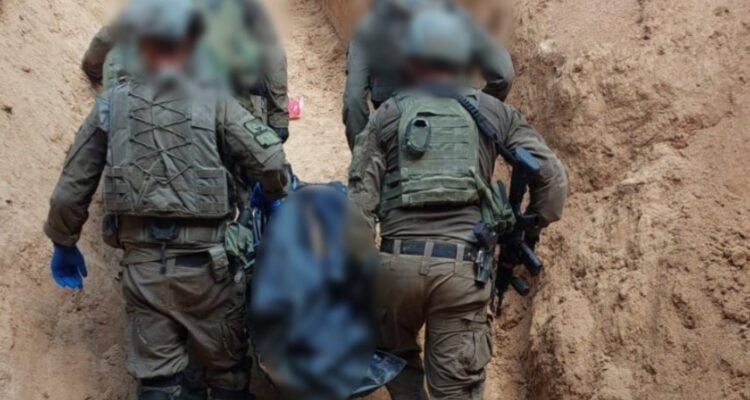‘It’s very moving. You know you’re making history here,’ he said.
By Anna Epshtein, TPS
On Thursday, Israel announced that soldiers recovered the bodies of five hostages from Khan Yunis.
Ravid Katz, Maya Goren, Oren Goldin, Sgt. Kiril Brodski and Staff Sgt. Tomer Yaakov Ahimas were all killed on October 7 and their bodies taken to Gaza.
All were already declared dead based on intelligence information.
The location of the bodies — a tunnel below the southern Gazan city — was learned primarily from interrogations of Palestinian terrorists captured in Gaza.
One of the soldiers involved in the mission, a reservist in an elite unit who cannot be identified, shared his story with The Press Service of Israel.
“I was one of the few people who actually were in the tunnel where the dead bodies were found. When we found the bodies, it was after a few similar operations in the recent weeks that ended with nothing,” he told TPS-IL.
On locating the bodies, he said, “It’s very moving. You know you’re making history here. It’s not just bringing the dead to be buried in Israel, but also to restore resilience in all of the Israeli public — resilience that was shattered on October 7.”
‘A Very Complicated Mission’
It was, he explained, “A very complicated operation from the engineering point of view, in a tunnel 20 meters below the earth, in the heart of fighting, where there were half a million people a week before we found the bodies.”
He told TPS-IL, “We cleared the area, ordering the population to evacuate, to find the tunnel and the bodies. We brought a lot of soldiers there. It was very complicated. I don’t know how much the public knows about that. The IDF invests so much in bringing home the hostages and the missing. Thousands of soldiers, night after night fought there for three weeks to bring these people to a burial in Israel. To allow these searches, you need a sterile area. And soldiers fight for this.
“You also need to know that this is a long war. In the beginning of the war the spirit was, ‘We don’t go home.’ But now the commanders try to send the soldiers home with any chance. Both the soldiers and the commanders are exhausted. The load on the soldiers is enormous. The soldiers are burnt out. And still, they perform any task at the highest possible level. I’m on the way home now, and I already have the task for Sunday,” he stressed.
“The war in Gaza is for many years. Everybody who fights there understands that this war will take many more years, because we are bearing fruits of many years of negligence. We saw Rafah, we saw the Philadelphi corridor with its dozens of tunnels,” he said.
The Philadelphi corridor refers to a buffer zone running the length of the Palestinian side of the 14 km Gaza-Egypt border.
It was created in 2006 to prevent weapons smuggling when Israel disengaged from the Strip, but Hamas violently seized control of Gaza the following year.
“Everybody knew they (the tunnels) were there. Israel knew, Egypt knew. And yes, they are in the hands of Hamas. It’s years and years of Sisyphean task. And yet we shall win, and we are already winning now. We just need to let ourselves acknowledge this,”the soldier said.
At least 1,200 people were killed, and 252 Israelis and foreigners were taken hostage in Hamas’s attacks on Israeli communities near the Gaza border on October 7.
Of the 115 remaining hostages, 39 have been declared dead. Hamas has also been holding captive two Israeli civilians since 2014 and 2015, and the bodies of two soldiers killed in 2014.





